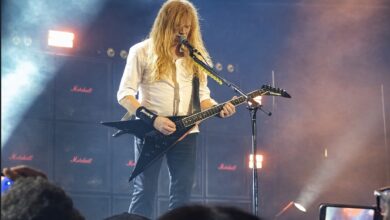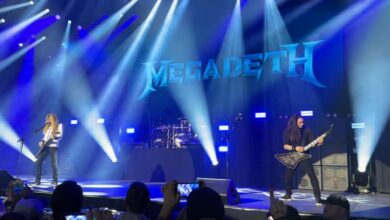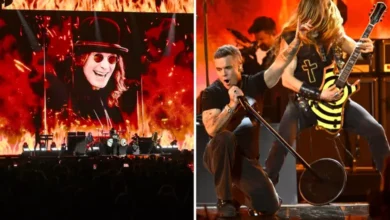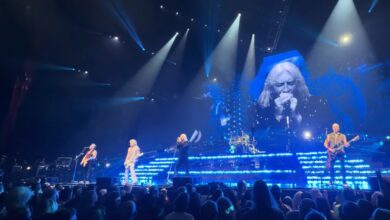When Heart Brought Led Zeppelin to Tears: The Kennedy Center “Stairway to Heaven” Tribute
There are performances that audiences expect to be good, and then there are moments that simply stop time. Heart’s rendition of “Stairway to Heaven” at the Kennedy Center Honors belongs firmly in the second category. It was not just a cover; it was a transformation, a living tribute that redefined how a classic could be honored.
From the very first notes, Ann Wilson’s voice carried the kind of gravity that instantly silenced the room. This was not an imitation of Robert Plant, nor was it an attempt to recreate Led Zeppelin note for note. Instead, it was pure Ann Wilson—confident, powerful, and soaring, with the depth of someone who had lived through decades of rock history and still had fire left in her voice.
Nancy Wilson’s acoustic guitar provided the foundation, delicate and respectful, yet strong enough to hold the weight of the moment. Her presence was understated but crucial, reminding everyone that Heart’s magic has always been the blend of these two sisters—one leading with voice, the other anchoring with strings.
Then came the choir, dressed in black, adding a layer of reverence and grandeur to the performance. Their harmonies elevated the song beyond a rock ballad into something almost spiritual. It felt like a hymn, but one born from the fire and chaos of the 1970s, now reimagined as a cathedral of sound in Washington, D.C.
The orchestra added another dimension entirely. The swelling strings and brass gave “Stairway to Heaven” a cinematic scope, emphasizing its rise from quiet ballad to thunderous climax. Where Led Zeppelin’s original relied on raw band chemistry, this performance leaned on the majesty of scale, creating a sound that seemed to fill not just the room, but the air itself.
At the center of it all sat Robert Plant, Jimmy Page, and John Paul Jones. The surviving members of Led Zeppelin were not just guests of honor; they were witnesses to their own legacy being refracted back at them through another band’s lens. Their faces told the story better than any critic could—first curiosity, then astonishment, and finally raw emotion.
Robert Plant in particular could not hide his feelings. His eyes shimmered with tears as Ann Wilson belted the lines he once sang as a young man. It was as if the song had come full circle—written in youth, reborn in maturity, and now delivered as a tribute by artists who themselves carried the torch of rock into another generation.
The performance’s visual symbolism made it even more unforgettable. Behind the band, a choir of men in bowler hats paid tribute to John Bonham, Zeppelin’s late drummer. It was a subtle, respectful gesture that did not need explanation. Anyone who knew Zeppelin’s history felt the weight of that moment.
What struck many was how naturally Heart made the song their own. Instead of trying to overshadow or replicate Zeppelin, they chose to channel its essence. The Wilson sisters had been influenced by Zeppelin since their earliest days, and this was not an act of flattery—it was an expression of gratitude, filtered through their own artistry.
The energy reached its peak in the final minutes. Ann Wilson’s voice soared higher, the choir roared louder, and the orchestra thundered behind them, until the entire hall was swept up in a wall of sound. It was more than just music; it was a communal experience, a uniting moment between performers, honorees, and audience.
As the last note hung in the air, the ovation was immediate and overwhelming. The crowd knew they had witnessed something historic. Plant wiped his eyes, Page leaned forward with a smile, and Jones clapped with quiet pride. These weren’t just gestures of politeness—they were acknowledgments that this performance had touched them deeply.
The legacy of that night spread far beyond the walls of the Kennedy Center. Millions watched the video online, sharing it with captions about goosebumps and tears. For younger generations, it was a first encounter with the song in a live setting; for older fans, it was proof that “Stairway to Heaven” still had the power to move hearts decades after its release.
More than anything, the performance underscored the timelessness of great music. A song written in 1971, performed in 2012, could still bring an audience to tears, still spark awe, and still feel relevant. That’s the magic of rock at its highest level: it refuses to age.
For Heart, it was perhaps their crowning moment as interpreters of rock classics. They had already built a career worthy of legend, but on that night they proved that they could stand shoulder to shoulder with the very icons who inspired them.
And for Zeppelin, it was a rare chance to sit back, reflect, and receive. To watch your work honored in such a profound way is a gift few artists get. In that hall, for those few minutes, music’s past, present, and future were united in a single breathtaking performance.





